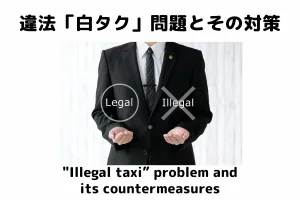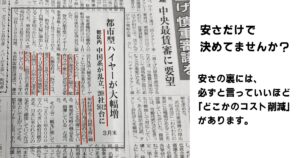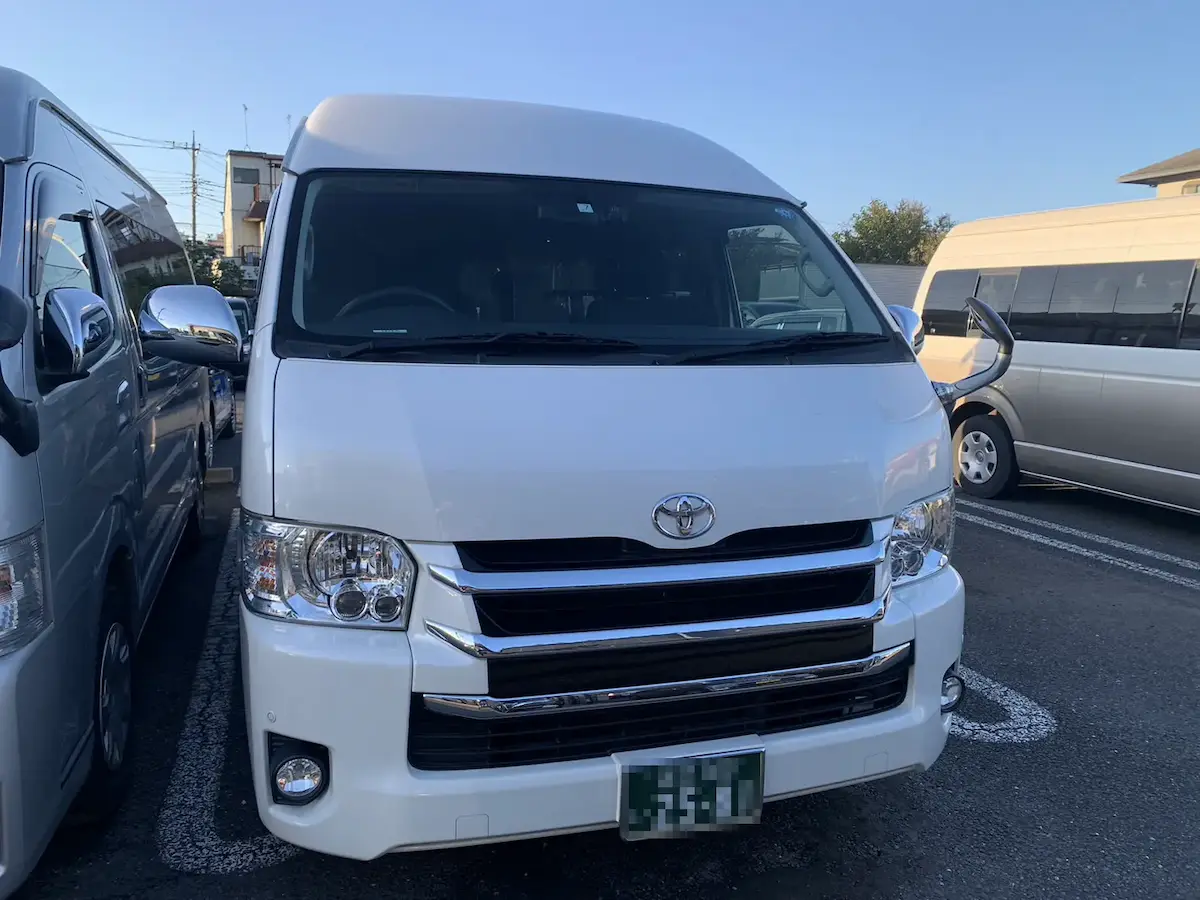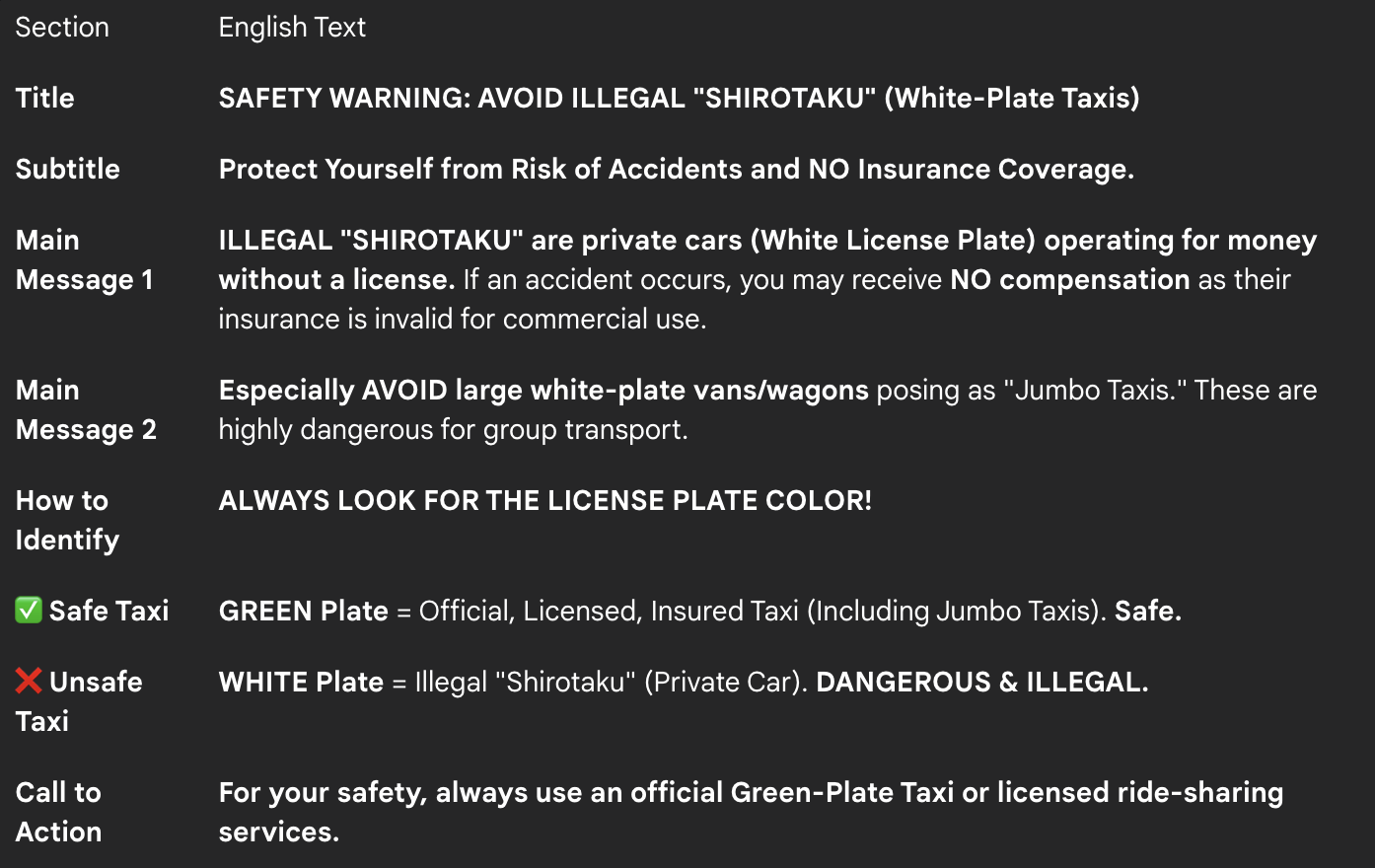In recent years, as the number of travellers to Japan has increased, the use of **illegal pick-up and drop-off services, so-called ''Shirotaku''**, under the slogan 'cheap and convenient', has increased rapidly.
However, there are immeasurable dangers lurking behind the scenes.
The tragic accident reported in 2025 highlighted once again the seriousness of this ''Shirotaku'' problem.In Wakayama Prefecture, there have unfortunately been fatalities in serious accidents involving large wagons (disguised jumbo taxis).
Illegal pick-ups and drop-offs using **large vehicles (white-plate wagons)**, especially those aimed at transporting large numbers of people, can easily cause extensive damage in the event of an accident,Not covered by formal insuranceThis is a fatal risk.
This article provides a thorough explanation of the following key points based on specific ''Shirotaku'' accidents that occurred in 2025.
- general traveller: how to recognise illegal **'fake jumbo taxis'** and how to prevent yourself from being involved in an accident.
- Inbound companies: 'Shirotaku'.Unwitting mediation and referralbe charged with a crime if you doSerious legal liability.and risk of loss of confidence.
Please read this information through to the end to ensure your journey is safe and in compliance with the law.
Cases of serious accidents related to ''Shirotaku'' reported in 2025 and their characteristics.
Entering 2025, **exposure of ''Shirotaku'' activities, particularly in tourist areas and local airports.and by.There have been a number of reports of serious accidents**. These cases show that ''Shirotaku'' are not only illegal, but also pose a risk to human life.
[Caution] "Fake jumbo taxis" with large vehicles.
'Jumbo taxis' provided by authorised taxi companies are licensed services using minivans and wagons. However, there are also illegal ''Shirotaku'' operators,Targeting visiting foreign groups.to the same type ofLarge wagonsThere have been a number of cases of people using **"jumbo taxis "** to provide transport services and operating as **"disguised jumbo taxis "**.
'Shirotaku' incident at Central Japan Airport; Vietnamese national arrested.
Aichi Prefectural Police arrested and sent a man and woman of Vietnamese nationality on suspicion of violating the Road Transport Law for **"'Shirotaku' "**, using private vehicles to transport customers for a fee.
According to the investigation, the suspects went from Central Japan International Airport (Centrair) to several destinations, including Nagoya City,Unauthorised paid pick-up and drop-off.It is alleged that. Both are said to have admitted to the charges.
In this series of incidents, we have already seenSeven Vietnamese nationals, male and female, arrested.been made, and the police have been told that they have beenRepeatedly operated 'Shirotaku' at low fares, mainly for Vietnamese nationals living in Japan.The investigation is continuing in the belief that.
Fatal wagon crash in Shingu, Wakayama Prefecture, Japan.
A collision with a large truck on a national road in Shingu, Wakayama Prefecture, during the 2025 holidays, in which eight tourists and other passengers were on board.station wagonwas involved. The accident tragically resulted in the death of one of the passengers. Subsequent investigations revealed that the man driving the van, a Chinese national, was suspected of **"'Shirotaku'" behaviour** transporting tourists for a fee.The victim has been arrested in This case,The danger of ''Shirotaku'' taking lives** is clearly demonstrated.
'Shirotaku' activities detected in Niigata Prefecture.
In addition, in October 2025, Niigata Prefecture will also have private vehicles carrying tourists.''Shirotaku'' behaviour.A Chinese national was caught red-handed on suspicion of These cases of detection show that white-taxi behaviour is rampant in tourist destinations across the country, and that the police and relevant authorities are becoming increasingly vigilant.
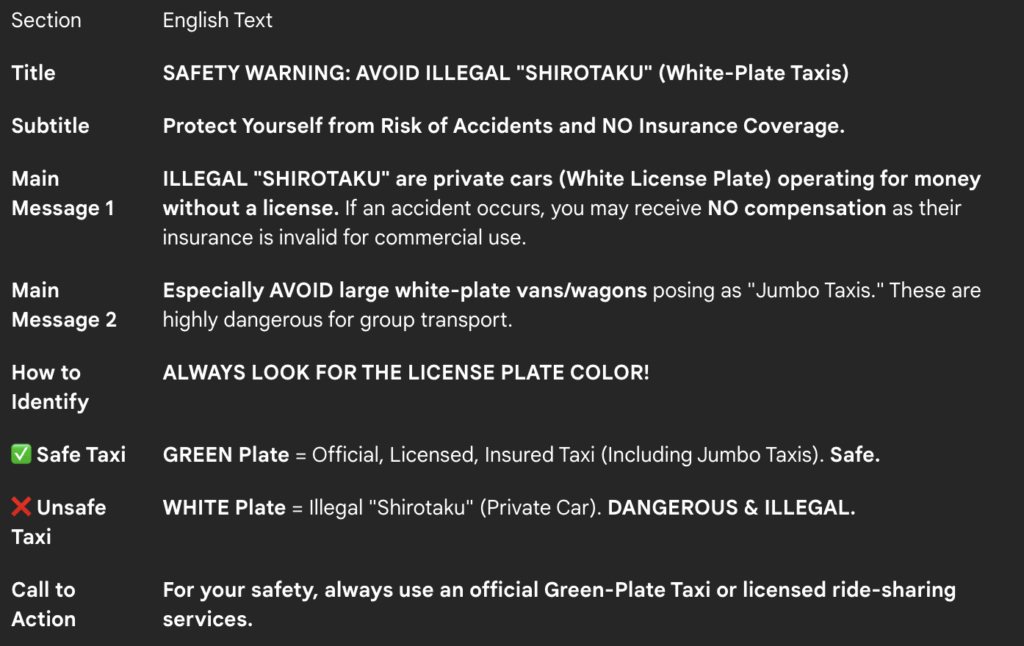
Dangers in which companies and businesses may be involved! Legal risks of using and mediating "'Shirotaku'".
Inbound-related businesses (e.g. travel agencies, accommodation facilities, local organisations) by introducing and using ''Shirotaku'' as a form of customer service,Unintentional complicity in crimeand may pose a significant risk.
Legal responsibilities that travel agents and accommodation establishments need to know about.
as a pick-up and drop-off service to customers in circumstances where they knew, or should have known, that it was an illegal ''Shirotaku'' activity.Mediation and referralIf it does, the company will beAiding and abetting violations of the Road Transport ActThe company may be asked to
[Attention. If an accident occurs, the company, as a referral source, is charged with breaching its duty to ensure the safety of its customers,loss of confidenceof course,claim for damagesThere is a risk that they may be subject to
Checklist for spotting fake transport services
To ensure safety and compliance as a company, it is essential to ensure that
- Colour of number plate: alwaysgreennumber plate (commercial vehicle)?
*There have been recent cases of licence plate lending, even in green. - Operational management system: do you maintain correct driver duty records, vehicle inspection records, etc.?
*Isn't operational management sloppy? - fee structure: are the charges based on a clear quotation, rather than an ambiguous transaction between individuals?
*Basically, urban hire cars have fixed rates, be wary of cheap suppliers.
The cost of a loss of trust is high.
If the word gets out that a company's customers have been involved in a case such as the "white cab accident 2025", the company'sbrand imageandcreditis irreparably damaged. It is extremely difficult to regain trust, especially from inbound customers.
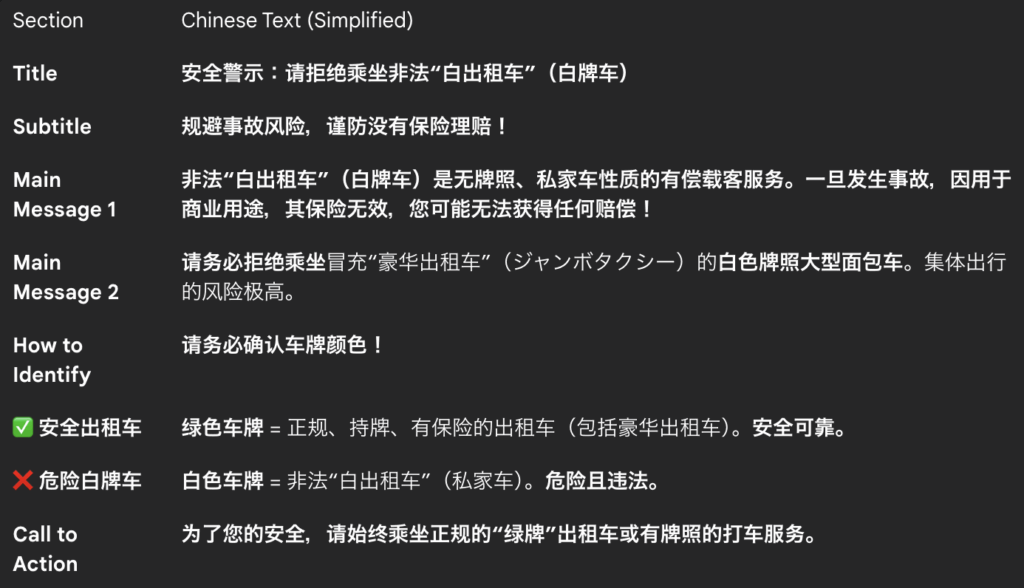
Why are ''Shirotaku'' (disguised jumbo taxis) particularly dangerous?
Behind 'cheapness' and 'convenience' there are structural dangers that are not present in professional operations.
Risk 1: Extremely inadequate 'compensation' in the event of an accident.
This is the biggest danger. Voluntary insurance for private vehicles (white licence plate) is,It does not envisage "transport for a fee."
In the unlikely event that a 'Shirotaku' causes an accident, resulting in injury or death of a passenger, it is extremely likely that the insurance company will refuse to pay for the insurance because it falls under the category of paid-for transport. In particular.bogus jumbo taxiwhere there are a large number of passengers, as in the case ofHuge amount of damages.but are not compensated at all.
Risk 2: Lack of vehicle safety and operational control
- Over capacity and overloading: they try to force group passengers on board and tend to operate without regard to safety standards.
- Quality of drivers.: There is no training in safe driving required for professional drivers, or in the physical condition and rest management necessary for long-distance driving. There is always a risk of serious accidents due to overworked drivers.
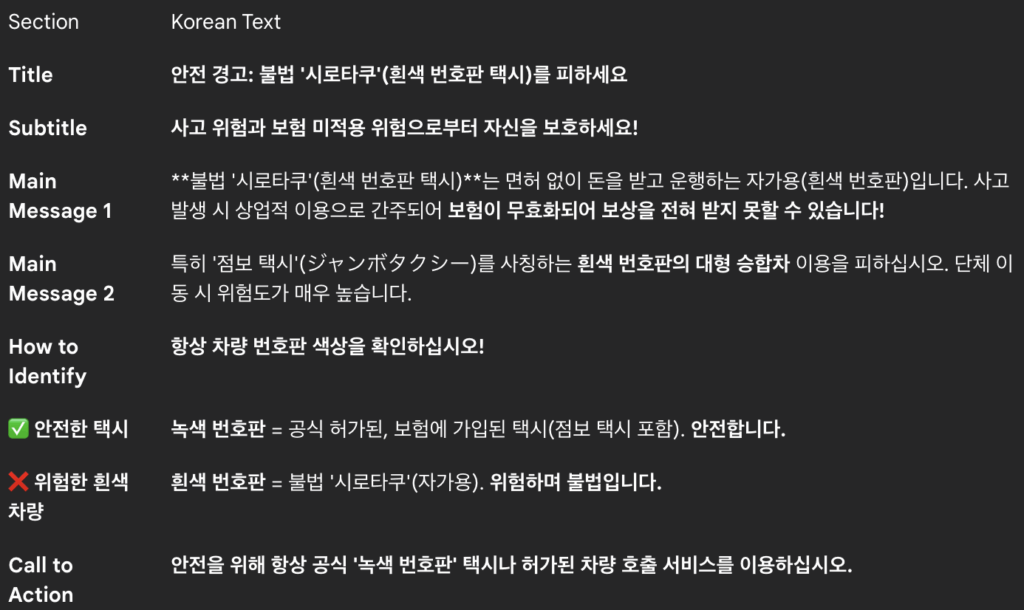
How to distinguish between legitimate 'jumbo taxis' and illegal ''Shirotaku'' and what to do about them.
The most important action travellers and businesses can take to protect themselves is to choose vehicles with 'green plates'.
*Note that 'green numbers' are also rented and borrowed these days!
Measure 1: Thoroughly check the colour of the vehicle number.
| service | Colour of number plate | operating permission | Safety and compensation |
| regular taxi (including jumbos) | green | existence (at the present moment) | Full insurance and operational management systems under the guidance of the Transport Authority. |
| Illegal 'Shirotaku'. (including fake jumbos). | white | without | No insurance coverage, no safety management system |
Measure 2: Deal only with legitimate operators
When requesting transport, companies should always ensure that the company is an authorised taxi company with a **"General Passenger Vehicle Transport Business "** licence, or an authorised hire-bus company, and keep a record of the transaction. It is important to eliminate easy intermediaries and personal referrals.
Measure 3: Ensure that employees and customers are aware of the situation.
- To Employees.: picking up and dropping off clients in private vehicles, especially when receiving fees, isIllegal white-collar activities.and ensure that guidance is given to ensure that this is never done.
- Dear customer.:regular** "green number".taxis and licensed vehicle dispatch apps, and proactively guide them to use hazardousUrge them to refuse pick-up and drop-off services with white licence plates**.
Summary: Safety and legal compliance is a corporate responsibility.
Reports of ''Shirotaku' accidents' in 2025 show that the risks posed by illegal transport services are at a level that can no longer be ignored.
The use of "'Shirotaku'", particularly the use of **"fake jumbo taxis" carrying large numbers of people**, is not only an act that puts travellers' lives at risk, but also poses serious business risks for companies in terms of **** legal violations and loss of confidence**.
In order to ensure a safe and comfortable stay and travel in Japan, it is important that each and every one of us chooses and uses the authorised services of **"green number "**.
